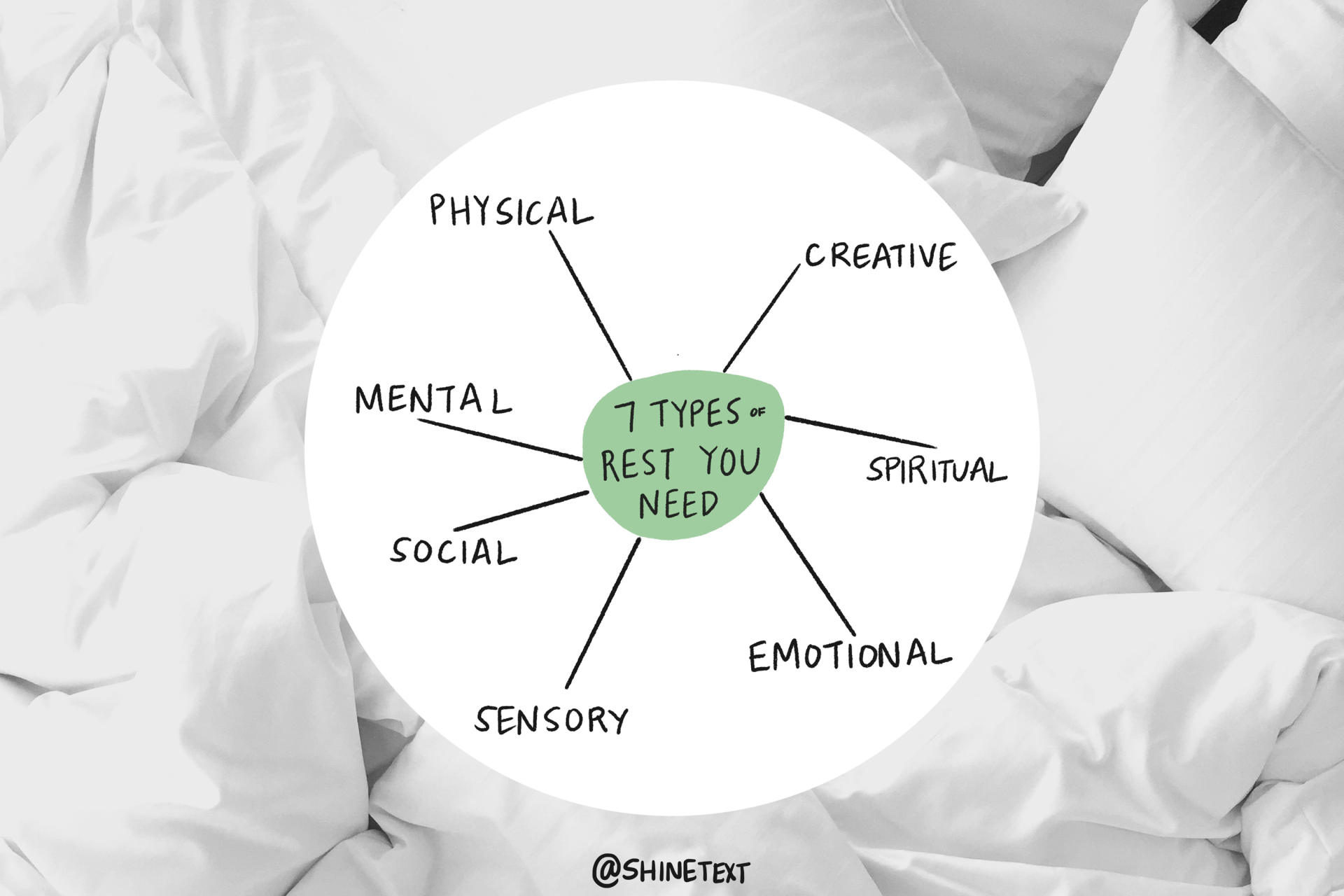The 7 Types of Rest You Need to Actually Feel Recharged
Quick: What’s your go-to form of rest?
I’ll start.
Whenever I was feeling rundown in a pre-COVID-19 world, I would book a Saturday afternoon pedicure and flip through as many trashy magazines as I can find. It would works—sometimes. But other times, I left the salon feeling even worse than when I arrived. I was jumpy, easily agitated, and more than a little tired. I may have rested my mind (and feet) but I was still missing something.
Turns out, I was missing six somethings.
Shutting your brain off can provide some rest in certain situations, but it’s just one of the seven forms of rest that help us to function as humans.
According to physician Saundra Dalton-Smith, M.D., author of Sacred Rest: Recover Your Life, Renew Your Energy, Renew Your Sanity, humans need physical, mental, social, creative, emotional, spiritual, and sensory rest.
“Most people, when they think about rest, they have a very one-sided approach—they lounge around, don’t do anything, and think that’s what rest is,” Dalton-Smith tells Shine. “We try it, and then when we’re still rest-deprived we think it doesn’t work.”
You’re likely in need of better rest if you feel the way I have leaving the nail salon. “People say, ‘I’m tired all the time, I’m drained,’” Dalton-Smith explains of her patients. “If they’re waking up (after sleeping) and still exhausted, the issue probably isn’t sleep. It’s likely a rest deficit.”
“If you're waking up (after sleeping) and still exhausted, the issue probably isn’t sleep. It’s likely a rest deficit."- Saundra Dalton-Smith, M.D.
Getting the proper type of rest requires ID’ing what, exactly, you're missing.
“For a lot of people, if you have a deficit in an area, you’re likely to experience specific symptoms,” Dalton-Smith says. “If your deficit is in mental rest, you might have trouble with concentration. If you have an emotional deficit, you may find you're snapping at your spouse and they haven’t done anything. If you have a sensory rest deficit, maybe you used to love 4th of July fireworks, but now you’re jumping out of your skin, or you’re chronically anxious when getting out of the car.”
Once you’ve figured out the type of rest you need, it’s time to adapt your rest to fit that specific need.
Share this article with someone in your life who needs to recharge.
Our national form of rest at the moment is to cancel plans and turn on the TV—a move that Dalton-Smith says can actually result in more exhaustion than before, since most of us need a break from screens.
Instead, she suggests methods tailored to your particular deficit.
Here’s how to get the rest you deserve.
Physical Rest
You’ll know if you’re physically exhausted: You’re struggling to keep your eyes open, and even walking to bed feels like moving through quicksand.
The most common form of physical rest is sleep, so consider hitting the hay 30 minutes earlier, or sitting out that HIIT class.
Catching up on physical rest can also mean taking deep breaths during the workday, or squeezing in a restorative yoga class to give your body some time to stretch. More energy (and less yawning) should be a pretty obvious sign that it’s working.
Mental Rest
Ever felt like your brain’s turned to mush? Then you know what it’s like to need mental rest.
You may realize you’ve been staring at the same page of a book for 10 minutes, or just sent a barely-comprehensible email. Perhaps you notice your thoughts starting to turn negative, judging everything you do (like, perchance, sending an awkward email).
The next time you need a mental break, turn off your screens and take a few moments to ground yourself. You might try adding a meditation to your day or simply repeating a calming mantra.
Social Rest
Socializing can be exhausting, but balancing draining encounters with restorative ones can help bring balance. “My biggest deficit is social rest,” Dalton-Smith says. “I’m an overachiever, I’m competitive, and I like to be moving toward goals—it becomes easy to be this solo warrior. So for me, (social rest) means finding people who are in my tribe—women I don’t have to compete with.”
For you, social rest might mean catching up with an old friend who knows the way you think and feel without any lengthy explanation. Or, perhaps it’s just taking a night off from socializing via Zoom and FaceTime and reconnecting with yourself.
Creative Rest
Chances are, you flex your creativity more than you think. Ever brainstorm solutions at work, or put together plans for a bachelorette party? You’re tapping into creative thinking—and putting yourself in need of creative rest.
Give yourself a break by going on a walk in nature, or reading an engrossing book. Surrounding yourself with inspiration can help replenish your drained resources—and take the pressure to create off your mind.
Emotional Rest
Think of how you feel after a funeral or breakup or rewatching Titanic—hungry, exhausted, and confused all at once.
Get some emotional rest by offloading your feels to a willing listener, then keep talking to prevent future emotional overload.
That could mean scheduling regular therapy sessions or finding people with whom you can be 100% yourself.
Spiritual Rest
Feel afloat, unanchored, alone? You’re likely in need of some spiritual rest. That could mean practicing your religion if that’s your jam, but it could also mean seeking out a sense of purpose, something to ground you and provide a little context.
Volunteering however you can might help you find that spark, as could chatting with a friend about the current state of the world.
Sensory Rest
Sensory exhaustion is one of the most prevalent drainers thanks to the prevalence of screens, Dalton-Smith says. In her practice, she’s seen it cause “a lot of eye strain and neck tension, and a lot of divorces and broken relationships,” she says. “It becomes easier to talk to the computer...That breaks intimacy, and overtime, it breaks relationships.”
Catch up on sensory rest by putting aside the technology and stepping outside for fresh air if you're able to do so. Check in with yourself before reaching for the remote on nights “off”—is staring at a screen really the rest you need?
You might consider a walk, or a good, old-fashioned book.
Read next: Blame it On the Zzzs: 7 Sneaky Ways a Lack of Sleep Can Derail Us

Shine is supported by members like you. When you buy through links on our site, we may earn an affiliate commission. See our affiliate disclosure for more info.


